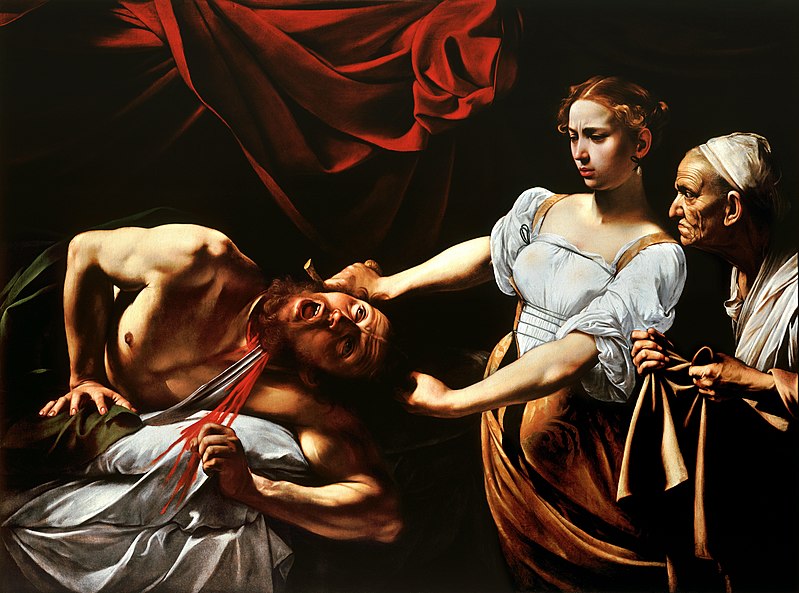|
Judith and Holofernes Men seem to have believed that books, art and music - the bases of civilization - would be the shield against the violent instincts of humanity. They seem to have convinced themselves that it would suffice to educate people to avoid war; a man or woman who read the great works of literature, appreciated the painting of the great masters and listened to erudite music would then be a peaceful being. Only the ignorant would be violent. How naive, or even stupid, that these thinkers were convinced that a book in their right hand would make them drop the knife in their left hand. For, on the contrary, it can only have made them hold on to it more tightly. How could they not see that evil, hatred and revenge are present in all cultural manifestations, starting with myths and religions? How could they not have noticed that in most of the stories in books and the subjects of paintings there were gods, men and women thirsty for blood? Power struggles, betrayals, murders, parricides, infanticides, rapes, incest and battles, an infinity of bloody battles where not even animals are spared, almost always justified by a heroic or religious cause. This is what culture means, and it is how men have hoped to save themselves. After all, who can remain indifferent to that extraordinary image of the beautiful Judith beheading the tyrant Holofernes who had enslaved the Jewish people? After seducing him and sleeping with him, Judith grabs his hair with her left hand to better cut his throat with the sword she holds in her right. The painter, Caravaggio, shows the last moments of Holofernes' life. In this baroque setting dominated by the contrast between light and darkness, Judith's white shirt, chest and part of her face radiate an angelic luminosity that absolve her of her act. And not even the old maid who holds the sack into which the tyrant's head will fall mars her purity. I wonder, then, how many thousands of people, visiting the museum where the painting was exhibited or seeing the books where it was reproduced, did not feel the urge to imitate it in the face of some Holofernes that made their lives hell? ** Portuguese: Os homens parecem ter acreditado que os livros, a arte e a música - considerados as bases da civilização – seriam o escudo contra os instintos violentos da humanidade; parecem ter-se pois convencido de que bastaria educar os povos para evitar a guerra; um homem ou uma mulher que lesse as grandes obras de literatura, apreciasse a pintura dos grandes mestres e ouvisse música erudita seria então um ser pacífico. A violência ficaria com os ignorantes. Que ingenuidade, ou até mesmo burrice, a destes pensadores convencidos de que um livro na mão direita faria largar a faca na mão esquerda. Pois, pelo contrário, só pode tê-los feito agarrá-la com mais força. Como não foram capazes de ver que a maldade, o ódio e a vingança estão presentes em todas as manifestações culturais, a começar pelos mitos e as religiões? Como não repararam que na maioria das histórias dos livros e dos temas das pinturas havia deuses, homens e mulheres sedentos de sangue? Lutas pelo poder, traições, assassinatos, parricídios, infanticídios, violações, incesto e batalhas, uma infinidade de batalhas sangrentas onde nem os animais são poupados quase sempre justificadas por uma causa heróica ou religiosa. Eis o que significa a cultura, na qual os homens depositaram a esperança de os salvar. Afinal, quem pode ficar indiferente perante aquela extraordinária imagem da bela Judith a degolar o tirano Holofernes que havia escravizado o povo judaico? Depois de o seduzir e dormir com ele, Judith pega-lhe no cabelo com a mão esquerda para melhor lhe cortar o pescoço com a espada que segura na direita. O pintor, Caravaggio, mostra os últimos instantes de vida de Holofernes que desperta do sono com os olhos revirados e a boca aberta enquanto o sangue, espesso como um caldo, lhe jorra do pescoço. Nesse cenário barroco dominado pelo contraste entre a luz e a escuridão, a camisa branca, o peito e parte do rosto de Judith irradiam uma luminosidade angelical que a absolvem do seu acto. E nem mesmo a velha criada que segura o saco onde irá tombar a cabeça do tirano macula a sua pureza. Pergunto-me, então, quantos milhares de pessoas dos tempos passados, visitando o museu onde estava exposta a pintura ou vendo os livros onde foi reproduzida, não sentiram vontade de a imitar perante um qualquer Holofernes que lhes infernizava a vida? João Cerqueira This is an excerpt from the author's manuscript, The Great Catastrophe. It was translated from the Portuguese by the author and edited by Graig Craig Powell. João Cerqueira was born and lives in Viana do Castelo, Portugal. He holds a PhD in Art History from the University of Porto.He is the author of nine books and is published in eight countries. He won the 2020 Indie Reader Awards, the 2014 Global ebook Awards and the 2013 USA Best Book Awards. www.joaocerqueira.com
0 Comments
Your comment will be posted after it is approved.
Leave a Reply. |
The Ekphrastic Review
COOKIES/PRIVACY
This site uses cookies to deliver your best navigation experience this time and next. Continuing here means you consent to cookies. Thank you. Join us on Facebook:
July 2024
|




